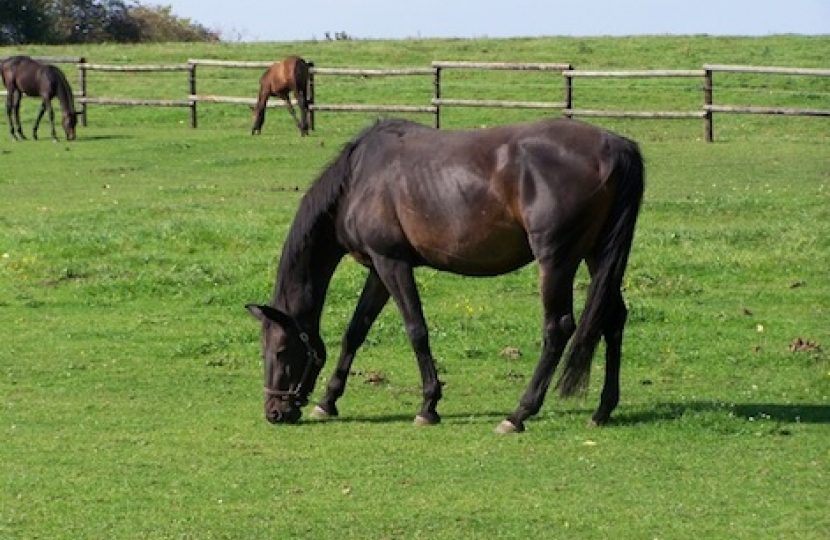
Damian Hinds has welcomed what he called "gathering momentum" among MPs in support of moves to tackle the scourge of horses being 'fly grazed'.
Damian's involvement in the issue followed the incident in which 46 horses were found in poor condition in a field in Alton. Shortly after their owner removed them, another 18 horses appeared in the same field. Redwings Horse Sanctuary, which took in some of the original 46, describes the condition of two of them as follows:
“We very tragically lost Georgiana, only two weeks after her rescue. Georgiana was suffering with salmonella - which several of these horses have - and also an horrendous small redworm burden. Mr. Darcy is also an orphan foal and must have lost his mother at Alton. He was so hungry that he had actually been chewing the tails of the other horses in the group.”
Damian called a debate in Parliament at which he said:
“There are four senses in which the practice of fly-grazing is a terrible problem. First, of course, there is often the terrible condition of the horses themselves, which suffer neglect and malnutrition.
“Secondly, when a farmer’s field is being grazed on, it is also a problem for the farmers. Grazing, where it is not authorised, is theft; it is theft of a farmer’s livelihood. Quite often, of course, the farmer is left to deal with the problem. Although they are the victim and not the perpetrator of the crime, they assume some responsibility for the horses.
“Thirdly, fly-grazing is a burden for those who must enforce the law, and for the charities that care for the horses. Currently, those charities find themselves significantly over-burdened as a result.
“Finally, fly-grazing is a great problem for the public—there are issues of public safety if, for example, horses get on to the public highway.”
Julian Sturdy MP, who also took part in that debate, came near the top of the private members' bill ballot and seized the opportunity to introduce a Bill to deal with this type of horse abuse.
The Control of Horses Bill makes provision for local authorities in England to be able to deal more efficiently with fly-grazing horses in public places in their area. The Bill amends the Animals Act 1971 (“the 1971 Act”) to give local authorities the power to detain straying horses or those placed intentionally and unlawfully in public places in their area.
The Bill also introduces a new procedure for local authorities regarding the detention and disposal of horses. Specifically, it allows horses to be disposed of 96 hours after detention, rather than fourteen days at present, and for disposal to include euthanasia or any other way (which could include giving it to a charity). Currently detained horses must be sold at a market or an auction, and many have little or no value; indeed, they are often bought back by the irresponsible owners who let them out to fly-graze in the first place.
As a private members' bill, the Control of Horses Bill is not guaranteed to progress all the way in to law, but as Damian Hinds notes, the issue now has a high priority for government.
Damian Hinds said:
“There have been some horrible instances of horses being fly-grazed and maltreated in East Hampshire, and I welcome any measures that help to tackle this appalling activity.
“Back in the debate that I secured last November, I called for the removal of horses to be made more straight-forward for local authorities, so I am pleased to see that this has made its way into the Bill. I look forward to seeing the Bill progress through Committee stage, so that we can continue trying to eradicate fly-grazing in East Hampshire and across the country.”

